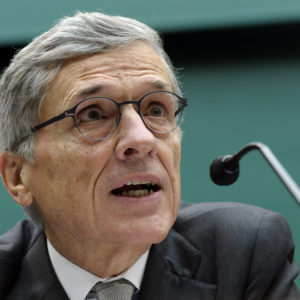Defense is not the strategy Federal Communications Commission Chairman Tom Wheeler has employed during his aggressive tenure heading the FCC, but it was the only play he had left Thursday after Republican lawmakers emboldened by President-elect Donald Trump forced the chairman to abandon a vote on price caps for the business broadband market — the first move in what could be an unraveling of a landmark agenda that included net neutrality and tough privacy rules for internet providers.
Typically emboldened by a White House that openly supported and in some cases even advocated for his major shakeup of the internet’s regulatory environment, Wheeler was forced to take another step back during the FCC’s November open meeting — the second since shelving his plan to unlock the set-top box marketplace — and defend rules he and his three-Democrat majority of commissioners have already passed.
“I think it’s an important thing to remember that taking a fast, fair and open internet away from the public and away from those who use it to offer innovative new services to the public, would be a real mistake,” Wheeler said during a press conference after the meeting.
“That taking away network privacy that consumers enjoy as a result of our decision would be a real mistake,” he continued. “That taking away connecting everyone whether you’re a school, a library, in low-income America, or a person in jail, taking that away would be a real mistake. And taking away the concept that the American economy works best when there is competition, competition, competition would be a real mistake.”
Wheeler added he couldn’t understand how issues like openness, access, consumer protection and privacy should be controversial.
The comments came after Republican leaders in Congress charged with overseeing the agency pressed Wheeler this week not to pass any more “controversial items” amid the ongoing Trump transition.
“[I]t would be counterproductive for the FCC to consider complex and controversial items that the new Congress and new administration will have an interest in reviewing,” Reps. Fred Upton of Michigan and Greg Walden of Oregon wrote to Wheeler Tuesday.
South Dakota Republican Sen. John Thune, who chairs the Senate Commerce, Science and Transportation Committee, warned the same day any such item would receive “particular scrutiny” from Congress, referring to rules slated for a vote Thursday to set price caps over what large internet providers can charge businesses and public services for high-capacity broadband for things like ATM networks and wireless towers.
“Leadership of the Federal Communications Commission will soon change,” Thune told the chairman. “I strongly urge the FCC to avoid directing its attention and resources in the coming months to complex, partisan, or otherwise controversial items that the new Congress and new administration will have an interest in reviewing.”
Wheeler said those rules would have helped make broadband more affordable and deploy it more widely for schools, libraries, small businesses and underserved rural areas.
“All of these matters are so-called ‘controversial’ because they are opposed principally by the largest incumbent firms in the sector,” Wheeler said. “As the deferred items reflect, when so-called controversy is the result of choosing between the broader common good or those incumbents preferring the status quo, I believe the public interest should prevail.”
Wheeler ultimately dropped anything from Thursday’s agenda that any commissioner objected to, including the approval of more Universal Service funds for expanding rural mobile broadband networks and requirements for TV providers to include audio descriptions of show content for blind consumers.
“It is truly disappointing that 1.4 million Americans living in rural areas without LTE service will continue to be so deprived. They deserve better from this commission,” Wheeler said. “And it is tragic that 1.3 million Americans who are blind and millions more who are visually impaired will not be able to enjoy expanded video description. They deserve better from this commission.”
Wheeler said he’s not yet committed on a date to step down as chairman, but that he was “committed to a smooth transition.” While Trump didn’t address net neutrality during his campaign but tweeted in 2014 he disagreed with the rules, a Trump transition team adviser said last week he expects the president-elect to appoint a chairman who would take a “less regulatory” approach to the issue.

